Physical Address
304 North Cardinal St.
Dorchester Center, MA 02124
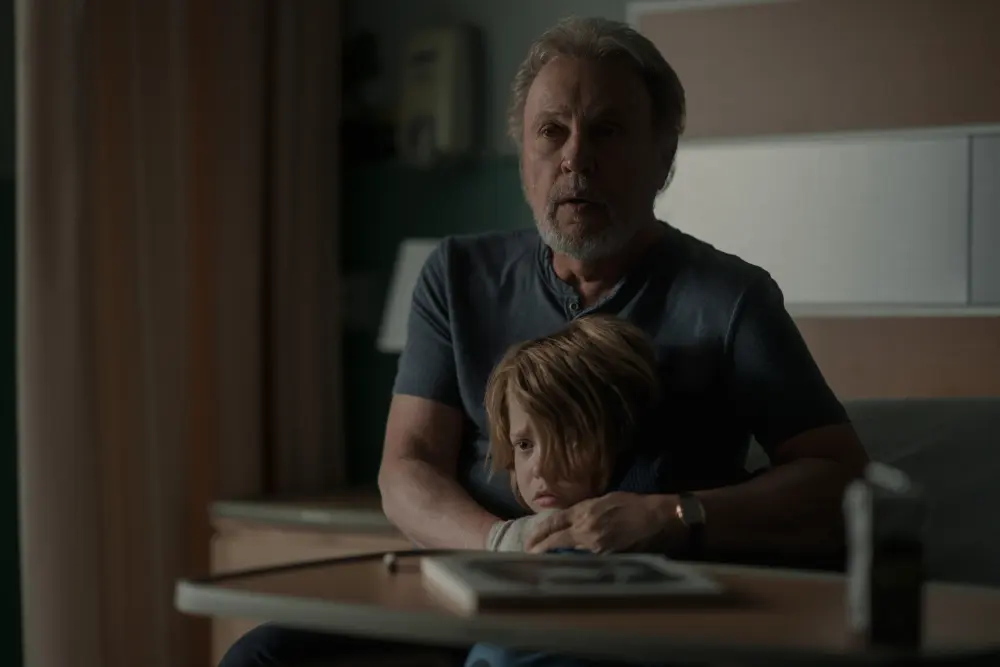
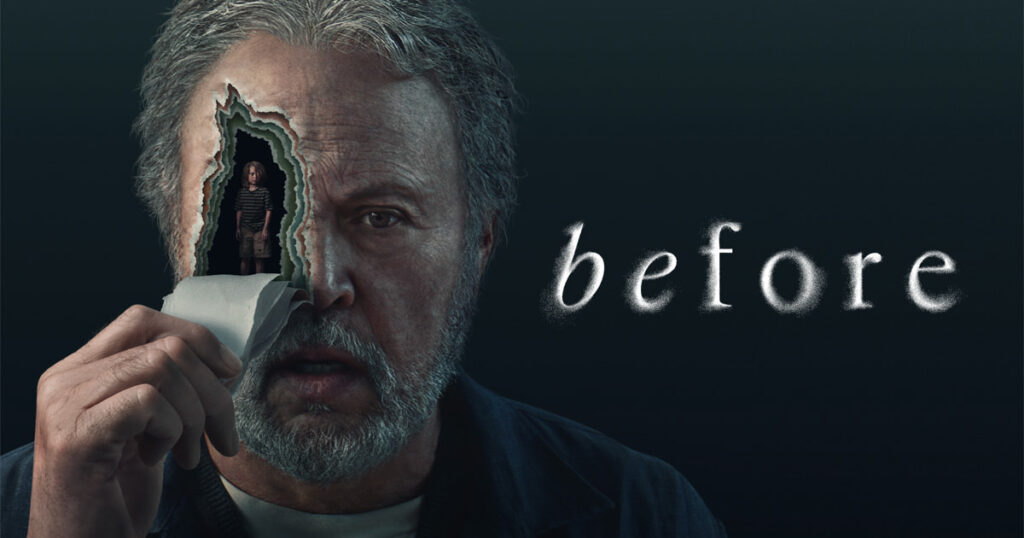
Since signing up for Apple TV+, I’ve been exploring a mix of shows, each one hinting at something unique about this platform’s style. I’ve watched Wolfs, Shrinking, and Disclaimer, and there’s a certain vibe I’m picking up on: Apple TV+ shows have this polished, almost cinematic feel. They don’t hit you with loud, flashy moments or overdone twists. Instead, they’re all about subtlety, blending genres in ways that feel sophisticated and restrained. It’s like Apple has found a way to make each show feel a little bit different from what you’d expect, but all within that same refined style.
So when I finished Disclaimer—a show I wanted to like but just couldn’t fully get into—I looked up the next Apple TV+ recommendation, and that’s when I found Before. The premise itself hooked me: a psychological thriller starring Billy Crystal as Dr. Eli Adler, a child psychiatrist dealing with the recent loss of his wife.
Things get even stranger when he meets a young boy who seems to be connected to Eli’s own past. It’s a show that, on paper, has all the elements of a thriller, but I had a feeling it would deliver something unique, like all the other Apple Originals I’d watched. And, I have to admit, the fact that it starred Billy Crystal sealed the deal for me.
Crystal is one of those actors who makes you feel something just by being on screen. He’s built his career on iconic roles—City Slickers, When Harry Met Sally, The Princess Bride—and he has a way of bringing depth and humor to every character he plays. But Before is different. This role is darker, more complex, and seeing Crystal take on this haunted, grieving character was a huge draw. Plus, he’s also on board as an executive producer, which made me even more curious to see what kind of story he wanted to tell.
I looked up a bit of the show’s background to see what I was getting into, and I saw that the series was initially set to be directed by Barry Levinson, but Adam Bernstein stepped in to direct the pilot. Sarah Thorp created and developed it, and with Crystal himself involved, I had a feeling this show was going to dive deep, not just skim the surface. But I wasn’t expecting to see the typical thriller tropes; I was hoping for something a little different, something with real tension and atmosphere.
Right from the opening credits, Before doesn’t waste any time setting its tone. It opens with a black-and-white sequence, the kind that instantly gives the show a creepy, almost cinematic vibe. I could tell this was going to be one of those slow-burn thrillers, where every detail is carefully chosen to build tension and mystery. And it worked—just a few minutes in, I was already feeling that sense of unease that tells you something isn’t quite right.
As the episode went on, I started to see how Before was going to take the familiar elements of a thriller but play them out in new ways. Eli’s grief, the eerie visions, the way his reality blurs—it all adds up to a story that’s more about the mind and the unknown than quick scares or easy answers. It’s clear this show is going to explore themes like trauma and loss, which aren’t exactly typical thriller material, and that’s what makes it so compelling.
So, after watching that first episode, I decided it would be worth diving into what makes Before different. Here are five ways this show is already setting itself apart from other thrillers, making it an Apple TV+ standout.
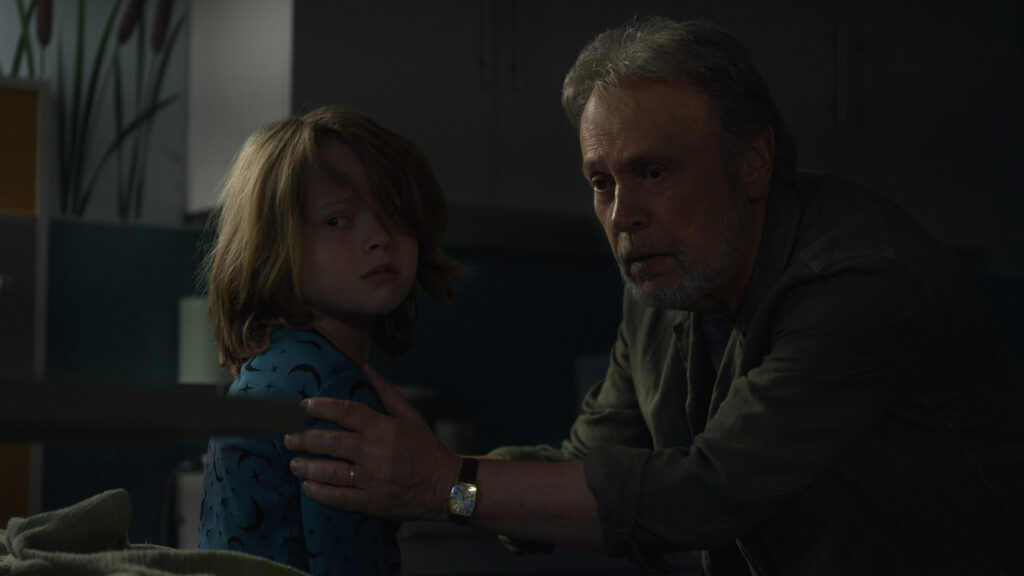
The first thing that pulled me into Before was seeing Billy Crystal take on a role that’s totally different from his usual characters. Crystal is known for his comedic timing and charm, whether it’s in When Harry Met Sally, City Slickers, or even as the lovable Mike Wazowski in Monsters, Inc.
He’s built a career on being the funny, relatable guy, and he’s never needed to be in every movie to make an impression. Each time he shows up on screen, he’s memorable. So the idea of seeing Crystal as Dr. Eli Adler, a character haunted by grief, was unexpected in the best way. It made me wonder: how would he handle this darker role? And would he bring his unique charisma into this intense, psychological story?
From the first moments Crystal is on screen, it’s clear he’s playing a character who’s carrying a lot of weight. Eli is a child psychiatrist, but he’s not your typical calm, composed doctor. He’s someone who’s dealing with his own loss, and you can see that heaviness in the way Crystal plays him. This isn’t a role that calls for his usual lighthearted humor or charm, but somehow, he still makes Eli feel real and relatable. It’s a subtle performance, with Crystal showing restraint and leaning into the quiet moments. There’s this vulnerability that he brings to Eli, and it’s fascinating to watch.
What really stands out is how Crystal’s presence alone adds layers to the show. He has this subtle charisma, even in a serious role, that makes Eli feel like someone you’d want to know. He’s dealing with grief, struggling with strange visions, and yet there’s a warmth to him that keeps you connected to his story. And it’s not like he’s just trying to be a different person on screen; you can feel that he’s bringing parts of himself into the character, which makes Eli even more compelling.
There’s this scene early on where Eli is with his therapist, and they’re discussing his wife’s death. It’s not a big, dramatic moment, but the way Crystal plays it—quiet, almost resigned—pulls you in. You can tell he’s done this before, maybe too many times, and he’s exhausted. It’s these little details that make his performance feel so real.
Another interesting aspect is that Crystal isn’t just acting in Before; he’s also involved behind the scenes as an executive producer. Knowing he’s had a hand in shaping the show makes you wonder what he saw in this story and why he chose to be part of it.
Maybe he was drawn to the challenge of playing such a complex, haunted character, or maybe he saw an opportunity to tell a story that’s darker, more introspective. Either way, it’s clear he’s invested in this role, and you can feel that commitment in every scene. There’s an intensity in his performance that feels new, a depth that makes you want to keep watchng to see where he’ll go with it.
For fans of Billy Crystal, Before is a chance to see him in a completely different light. It’s refreshing to watch him step away from the roles he’s famous for and dive into something darker. It’s not just a new role—it’s a new side of Crystal as an actor. And for those who may not be as familiar with his past work, this performance alone is enough to show why he’s such a respected actor. He brings a level of skill and subtlety to Eli that gives the whole show a deeper emotional pull.
In Before, Billy Crystal proves he’s not limited by genre or typecasting. His portrayal of Eli Adler shows he can handle drama with the same ease he’s brought to comedy all these years, making his shift to this serious, layered role one of the show’s biggest strengths. Watching him in this role, you get the sense that there’s a lot more to discover, both about Eli and about Crystal as an actor, and that’s what makes his performance so compelling.

From the opening scenes of Before, it’s clear this show isn’t just here to tell a straightforward story. Instead, it dives into a slow, creeping mystery that feels like it’s meant to get under your skin. Right away, we’re introduced to Dr. Eli Adler, played by Billy Crystal, a psychiatrist who’s grieving the recent loss of his wife.
It’s obvious he’s dealing with some heavy emotions, but it’s also clear that his story is far from simple. The whole setup has this eerie, dreamlike quality that makes you question what’s real and what’s in Eli’s mind, setting the tone for a psychological thriller that’s going to be as much about what’s happening in his head as it is about anything external.
The mystery kicks off when Eli encounters a young boy named Noah. From the moment this kid appears, he feels out of place—a little too quiet, a little too intense. There’s a scene where Eli spots Noah outside, scratching something onto a door with bloody fingers. Eli’s drawn to him, and it’s as if they share some kind of invisible connection.
And then, just like that, Noah disappears, leaving Eli questioning what he saw. Right from this first encounter, the show makes you feel as uncertain as Eli does. Is Noah real? Is he a figment of Eli’s mind? Or is there something deeper and darker going on here?
The psychological aspect of Before isn’t just window dressing; it’s woven into the core of the show. As Eli tries to piece together what’s happening, his grip on reality feels like it’s slipping, and as viewers, we’re right there with him. The boundaries between his memories, dreams, and reality start to blur, and that tension builds with every scene.
One moment, he’s speaking to his late wife, Lynn, as if she’s still there, and the next, he’s staring into an empty room, realizing she’s only in his mind. But then Noah reappears, and suddenly it seems like maybe there’s a thread connecting all these fragments, something Eli can’t yet see but desperately needs to understand.
One of the most intriguing parts of the mystery is the way it plays with time and memory. Eli’s visions often seem rooted in his past, but they’re mixed up in his present reality in a way that’s unsettling. There’s a scene where Eli sees an old, worn-down house that seems to haunt him. He finds a photograph of it on his fridge, and it immediately brings back feelings he can’t shake off.
This house feels symbolic, almost like it’s tied to something Eli’s not ready to face yet. It’s these small, haunting images—visions that feel real but have a shadowy, almost ghostly quality—that pull you into Eli’s world of half-remembered moments and fears he hasn’t fully processed.
What makes this mystery even more engaging is that it’s not spoon-fed to us. Before leaves you with just enough hints and clues to start piecing things together, but it never feels like it’s rushing to explain itself. The eerie, suspenseful pacing builds tension slowly, making each new piece of information feel important. It’s not a show that relies on big, dramatic reveals or cheap jump scares; instead, it builds its mystery layer by layer, pulling you in gradually. You get the sense that every unsettling moment, every strange encounter, is leading somewhere, even if it’s unclear where that will be.
And just when you think you might be getting closer to understanding what’s happening, Before throws in moments that add even more layers to the mystery. Eli begins seeing more of Noah, and there’s an unsettling familiarity between them. There’s even a moment when Eli dreams of Noah, only to wake up and find him standing right there, as if the boy has somehow crossed over from his nightmares into reality.
These moments blur the line between Eli’s inner world and the real world so effectively that you can’t help but start to question everything along with him. Is this haunting connection between Eli and Noah tied to his grief? Or is there something supernatural going on? The show teases these questions without giving away too much, keeping that tension alive.
It’s rare to find a thriller that’s so willing to embrace ambiguity and let the story breathe, but Before does just that. This isn’t a fast-paced, action-packed thriller; it’s a deeply psychological journey into the unknown. The show’s creators take their time with each eerie moment, letting the mystery unfold in a way that feels organic, even hypnotic. By the end of the first episode, you feel like you’ve barely scratched the surface, yet you’re already hooked, drawn into Eli’s world of unexplainable visions and unspoken trauma.
For fans of psychological thrillers, Before offers a unique twist. It’s not just about uncovering what’s going on with Noah or why Eli is seeing these strange visions—it’s about understanding Eli himself, his grief, and the mental toll of his loss. This isn’t a show that gives easy answers, and that’s what makes its mystery so captivating. It’s the kind of haunting, psychological thriller that stays with you long after the episode ends, leaving you thinking about what might be waiting around the corner for Eli—and for us as viewers.
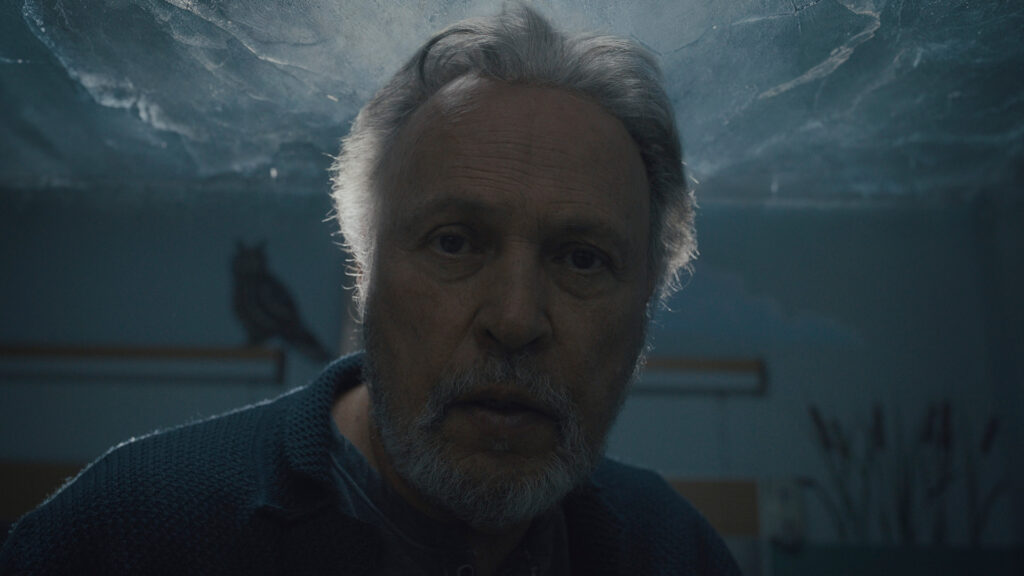
One thing Apple TV+ has consistently delivered is a visually striking style that feels almost cinematic in its attention to detail. Before is no exception, and right from the start, you can tell this show has a look and feel that sets it apart from typical thrillers. Apple seems to have mastered the art of creating shows that are polished and immersive, and Before leans into that aesthetic with its own eerie twist. The cinematography, the lighting, even the way scenes are framed—every element feels intentional, adding a subtle layer of sophistication to the story.
The show opens with a black-and-white sequence that immediately sets the tone. It’s artsy, almost minimalist, with haunting music playing in the background. There’s something about the way these opening credits are put together that tells you this isn’t going to be a quick thrill ride; it’s going to be a slow, atmospheric experience that unfolds piece by piece.
Right away, the visuals pull you in, creating a sense of mystery and tension. There’s no rush to get into the action—instead, the show invites you to sit back, take in each frame, and let the atmosphere build on its own.
Apple TV+ has a knack for making each scene feel like it could be a still photograph, and Before is filled with these kinds of moments. The colors are muted, giving everything a slightly washed-out, almost dreamlike quality that perfectly suits the show’s eerie tone.
When Eli is in his apartment, there’s this calm, quiet tension that fills the space. The lighting is dim, with shadows cast in ways that make you feel like something could emerge from the darkness at any moment. The way the light hits his face, the shadows around him—it all feels carefully composed, as if every shot is meant to say something about Eli’s inner world.
One of the standout moments in the first episode is a scene where Eli is looking at a photograph of an old, rundown house. It’s just a picture, but the way the camera lingers on it gives it this haunting, almost symbolic weight. The house seems to represent something about Eli’s past, his grief, or maybe even his fears, and the way it’s framed makes it feel almost like a character itself. You don’t see this kind of careful, almost poetic framing in many thrillers, but Apple TV+ has a way of making each shot feel meaningful, adding layers to the story without needing words.
The show also uses depth and perspective to create a sense of isolation and unease. There are scenes where Eli is shown against a wide, empty background, making him look small and almost vulnerable. It’s a simple technique, but it adds so much to the atmosphere. You feel the weight of his loneliness, his grief, just in the way he occupies space.
There’s a scene where he’s sitting alone in his office, with the city skyline in the background, and the whole scene feels cold and distant. The choice to frame him this way reinforces the themes of isolation and loss that run throughout the show, giving you a visual sense of how cut off he is from the world around him.
The sound design also plays a big role in creating the show’s cinematic feel. The music is subtle but suspenseful, adding an extra layer of tension without overpowering the scenes. The soundscape is mostly quiet, with only occasional, eerie notes that seem to echo Eli’s own feelings of uncertainty and fear. When Eli starts seeing visions or hearing things that may or may not be real, the music intensifies just enough to put you on edge, drawing you deeper into the mystery. It’s a technique that Apple TV+ seems to use often, creating soundscapes that feel as carefully curated as the visuals themselves, adding to the overall sense of sophistication.
This cinematic style isn’t just about making things look nice; it’s part of how the story unfolds. The way Apple TV+ presents Before—with its polished shots, carefully designed sets, and moody lighting—gives the show an edge. It feels almost like you’re watching a film, with every scene meant to draw you in and make you question what’s real. This attention to visual and auditory detail isn’t something you typically see in a TV thriller, but it’s becoming a trademark of Apple’s shows, and it gives Before an extra layer of intrigue.
What’s fascinating about Before is how it uses this visual style to keep you just slightly off balance. The muted colors and moody lighting make it feel like you’re slipping in and out of Eli’s mind, experiencing the world through his perspective. Scenes shift in tone and color depending on what Eli is feeling, and that subtle shift makes you question how much of what we’re seeing is actually real. It’s a clever way of using
Apple’s signature style to serve the story, adding to the psychological element of the show.
Apple TV+ seems to have perfected this cinematic approach, and it’s one of the reasons Before feels so distinct. The style isn’t just about making things look good—it’s about creating an experience that immerses you fully, pulling you into Eli’s haunting world.
The show’s visuals and sound work together to build a kind of quiet suspense, drawing you in without needing flashy effects or over-the-top twists. It’s understated but powerful, the kind of storytelling that lingers, making you want to keep watching to see what unfolds next.
By combining a slow-burn mystery with such a refined aesthetic, Before achieves something that feels genuinely unique. This isn’t just a thriller; it’s a story told through carefully chosen visuals, sounds, and pacing, all designed to make you feel like you’re unraveling the mystery right alongside Eli. And in a world of thrillers that often rely on easy scares, Before stands out by creating tension through pure atmosphere.
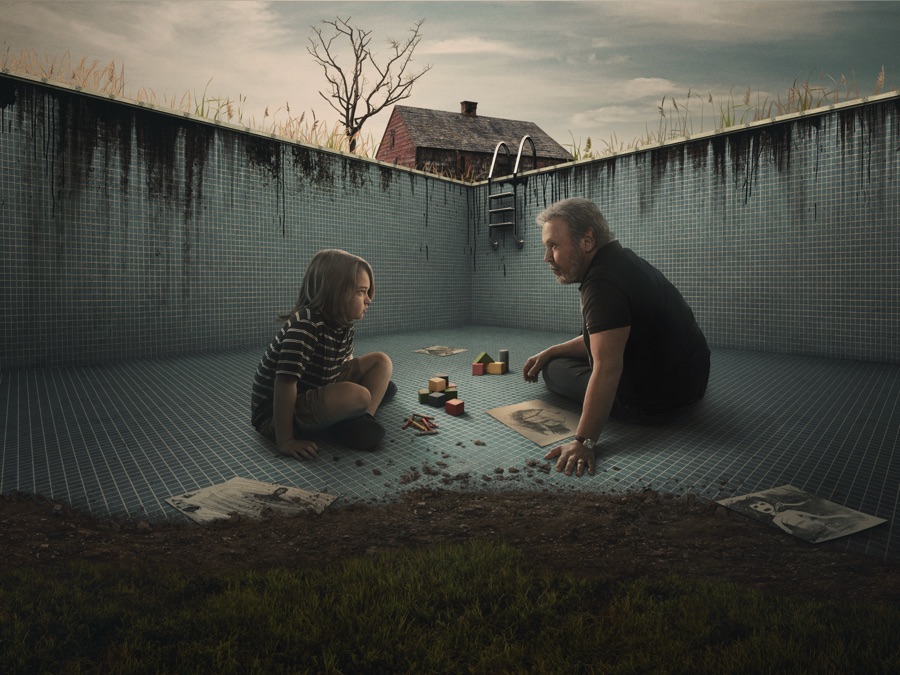
One of the standout qualities of Before is how it defies easy classification. It’s labeled as a psychological thriller, but as you watch, you start to feel like that barely scratches the surface. Before isn’t just about creating suspense or shocking the audience; it’s about layering different elements—horror, drama, psychological mystery—to create a show that feels rich and complex. The result is something unique: a show that pulls you in with the tension of a thriller but also hits you with moments of emotional depth and surreal, almost supernatural touches.
As Before unfolds, it plays with conventions from horror and drama in a way that keeps you guessing. For example, there are scenes that feel almost like they belong in a horror film, with Eli seeing eerie visions and hallucinations that unsettle both him and us as viewers.
But instead of throwing in cheap scares or horror tropes, the show uses these elements sparingly, almost like hints of something darker lurking beneath the surface. It builds up tension slowly, letting these strange occurrences simmer in the background, which makes them even more effective. The unsettling moments creep in quietly, keeping us on edge without ever feeling over the top.
The psychological element is strong here, but unlike many psychological thrillers, Before doesn’t just focus on a straightforward mystery or crime. Instead, it dives into the complexity of Eli’s mind and his emotions, showing us his grief, confusion, and struggles with reality. The thriller aspect of the show comes not just from what’s happening externally, but from the question of what’s real versus imagined in Eli’s mind.
His encounters with Noah—the strange boy who seems to hold a key to his past—feel like they’re pulled from a dream, with details that are vivid but don’t entirely make sense. There’s a surreal quality to these scenes that gives Before a hint of the supernatural without fully stepping into that genre, leaving us in this eerie, in-between space.
The drama aspect of Before is also crucial to its genre-blending style. At its core, this show is as much about Eli’s personal journey as it is about solving any mystery. He’s a man dealing with profound loss, and the show doesn’t shy away from showing his grief in raw, unfiltered ways.
There are quiet scenes where Eli is simply alone, wrestling with memories of his wife or staring at an old photo that seems to haunt him. These moments slow down the pace, pulling us into Eli’s emotional world and reminding us that his story is deeply human. It’s not just about the thrills or the suspense—it’s about understanding the weight Eli carries and how his mind is trying to cope with it all.
One of the most intriguing aspects of Before is how it toys with supernatural elements without fully committing to them. There are times when Eli’s visions seem like they’re hinting at something otherworldly—a ghost, a spirit, or even a connection to the past. But the show keeps it ambiguous, leaving us wondering if these visions are just his mind’s way of processing trauma or if something darker is at play.
This ambiguity is fascinating because it adds to the mystery without giving anything away too soon. We’re kept in suspense, wondering if we’re watching a grounded thriller with psychological twists or if the story is going to veer into supernatural territory. It’s this constant balancing act that makes Before feel fresh and unpredictable.
This genre-blending approach also helps to set the tone for each episode, making Before feel like more than just a thriller. One minute, you’re watching a quiet, introspective scene where Eli is alone with his thoughts, and the next, you’re thrown into an intense, suspenseful encounter that feels straight out of a horror film. And then, just as suddenly, you’re back in the drama, seeing Eli confront his own vulnerability and fears. These shifts keep you engaged and make the story feel layered, as if each genre element is revealing a different side of Eli and his struggle.
In a streaming world where many thrillers stick to a formula, Before offers something different. It’s not afraid to slow down and dig into emotional moments, even if that means breaking away from the typical thriller pacing. And it’s not trying to scare you with flashy scenes or shock value. Instead, it creates suspense through subtle, genre-bending storytelling that’s grounded in character. The horror elements, psychological twists, and emotional drama all come together to create a show that feels like a puzzle you’re piecing together with each episode.
For fans of thrillers, horror, or even psychological dramas, Before is a fascinating blend of all three, and it keeps you guessing in ways that feel organic rather than forced. Each genre element serves the story, adding layers of depth to Eli’s character and making the mystery feel more personal and intense. By weaving these genres together so naturally, Before doesn’t just stand out—it feels like a whole new kind of thriller, one that invites you to dig deeper and experience each eerie moment right alongside Eli.
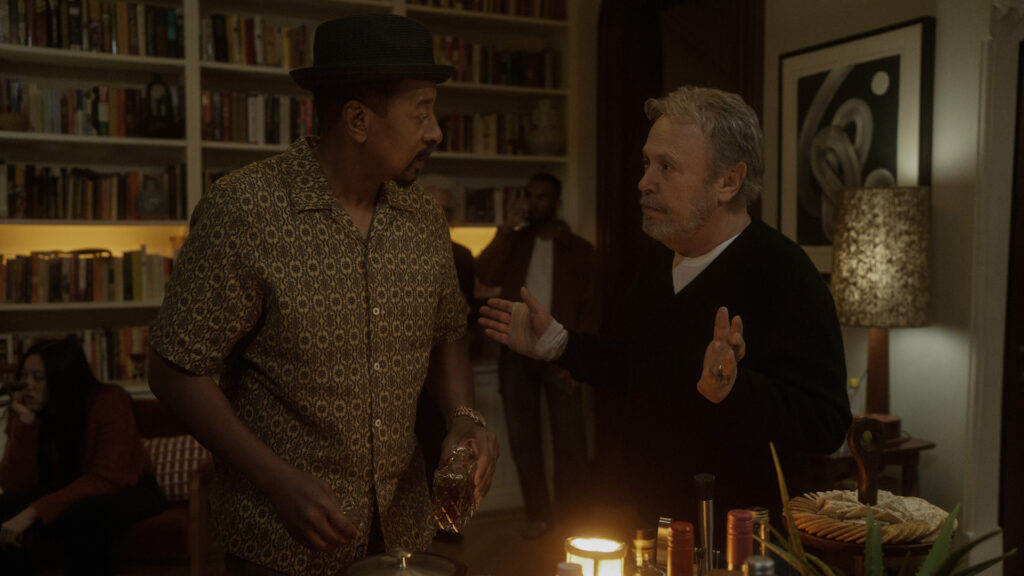
One of the most subtle yet impactful elements in Before is its sound design. While we often think of thrillers as relying on visual cues to build tension, Before uses sound in a way that enhances every eerie moment, every unsettling scene, drawing you deeper into Eli’s troubled mind. The sound design here isn’t loud or jarring; it’s hauntingly quiet and intentional, making the atmosphere feel tense and suspenseful from start to finish.
Right from the beginning, the show introduces us to a score that feels restrained yet ominous. The opening credits feature this muted, almost hypnotic music, setting the stage for what’s to come. It’s not the type of music you’d find in a horror film designed to make you jump—it’s more like a slow, creeping sound that builds an unsettling tension. This choice is what makes Before so different from typical thrillers. The sound doesn’t command your attention, but it lingers in the background, making you feel like something is lurking just out of sight.
As the story unfolds, sound plays a huge role in establishing Eli’s world. In scenes where he’s alone, sitting in his dimly lit apartment or wandering through empty spaces, there’s a deliberate quiet that makes you lean in, almost expecting something to break the silence. When sounds do enter the scene, they’re subtle but heavy. You might hear the hum of a distant street, the ticking of a clock, or the faintest creak in the floorboards—ordinary sounds that somehow take on an eerie quality in Eli’s world. It’s as if the silence itself is alive, and every small noise becomes amplified in the emptiness around him.
One of the standout moments in the first episode is when Eli first encounters the mysterious boy, Noah. The scene unfolds with minimal dialogue and no loud music or sound effects. Instead, the soundscape is filled with small, almost imperceptible sounds—Noah’s quiet footsteps, the faint rustle of his clothes, the scratching of his fingers on the door.
These sounds are so subtle, but they pull you in, making the scene feel intensely real and uncomfortable. The tension doesn’t come from what you see; it comes from what you hear or, sometimes, what you don’t hear. This use of quiet, restrained sound makes every moment feel unsettling, as if you’re right there in the room with Eli, experiencing his fear and confusion firsthand.
Music in Before is also used sparingly but effectively. There are no sweeping scores or dramatic crescendos. Instead, the music slips in almost unnoticed, heightening the suspense without overpowering the scene. When Eli begins to see visions or struggles to differentiate between reality and his mind, the music shifts subtly, taking on a darker tone. It’s not meant to tell you how to feel—it’s there to deepen the already-existing tension. The music ebbs and flows with Eli’s emotions, mirroring his descent into uncertainty and making us feel that unease right along with him.
Another brilliant choice in the sound design is the way it plays with echoes and distortion during Eli’s visions and hallucinations. In scenes where he’s haunted by images of his wife or strange memories from his past, the sounds take on an ethereal, slightly warped quality, as if they’re coming from a place outside of reality. Voices echo in a way that feels otherworldly, making you wonder if these sounds are memories or manifestations of Eli’s grief.
This distortion adds a layer of disorientation to the scenes, blurring the lines between what’s real and what’s imagined, pulling us further into Eli’s mind. It’s a subtle effect, but it makes a huge impact, giving the sense that Eli is slipping away from reality, and we’re right there with him.
The sound design also complements the show’s visual style, working hand-in-hand to create an immersive experience. For example, when Eli is alone in his office or his apartment, the sound and lighting work together to build that sense of isolation. The scenes are quiet, with only faint ambient sounds—a distant car passing by, the hum of a heater, or the creak of an old chair.
These sounds are barely noticeable, but they fill the silence just enough to make the space feel real and grounded. And then, when the eerie music comes in or when there’s a sudden silence, it hits you harder because of the natural, quiet soundscape that’s been established. It’s a masterful way of creating suspense without having to rely on loud noises or shocking musical cues.
In Before, even the smallest sounds seem loaded with meaning. The silence and minimal sound in Eli’s world reflect his mental state—his loneliness, his grief, and the way he’s cut off from the world around him. The sound design makes you feel Eli’s isolation deeply, putting you in his shoes in a way that’s unsettling but effective. And when the eerie, suspenseful notes do come in, they’re subtle but powerful, giving you that unmistakable feeling that something isn’t quite right.
For a psychological thriller, Before does an impressive job of using sound to heighten the emotional and psychological tension without overpowering the story. The sound design enhances the mystery and adds to the suspense, pulling you into Eli’s world and making you feel his unease.
It’s a quiet, haunting soundtrack that lingers in the background, just enough to make you feel the weight of Eli’s isolation and the eerie presence of whatever is haunting him. In a genre where sound can often be overdone, Before uses it with restraint and purpose, adding to its unique, sophisticated atmosphere. This approach to sound is part of what sets Before apart and makes it a truly immersive viewing experience.
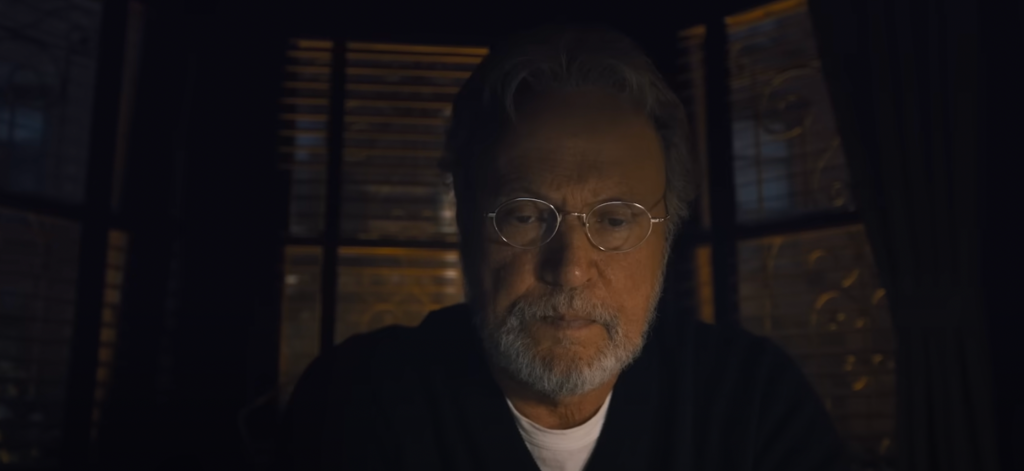
After watching the first episode of Before, it’s clear this isn’t your average thriller. Apple TV+ has taken a familiar genre and turned it into something unique—an experience that’s as much about atmosphere and subtle tension as it is about plot.
With Billy Crystal delivering a performance that’s layered and complex, stepping into the role of a character haunted by both grief and mystery, we’re invited into a story that doesn’t follow the typical thriller formula. Crystal brings a warmth and depth to Eli that’s rare in a genre filled with hardened detectives or edgy anti-heroes, making his journey feel intensely personal.
The show’s slow-burn, psychological mystery keeps you questioning everything, pulling you deeper into Eli’s mind as the lines between reality and imagination blur. And then there’s the way Before looks and sounds—Apple TV+’s trademark cinematography and sound design elevate the show, making each frame feel like it’s part of a larger puzzle, each quiet note building an eerie tension you can feel even in the silence.
In blending elements of horror, drama, and psychological suspense, Before stands out as a series that defies expectations. It’s patient in its storytelling, choosing to let tension build and emotions simmer rather than going for quick scares or flashy twists. This approach gives the show a depth and richness that’s both intriguing and unsettling, making it a thrill to watch without ever feeling forced.
So if you’re a fan of thrillers but are looking for something with a little more weight and complexity, Before might just be the series to watch. It’s a story that’s not afraid to slow down, to explore emotions and leave you hanging in suspense. After just one episode, I’m already hooked, and I can’t wait to see where this haunting journey will take Eli—and all of us watching.

Curious about what our monthly digest offers? Head over to our newsletter page to learn more, or simply sign up below to get The Stream Snob Monthly Digest with the best streaming picks, exclusive insights, and the latest trends across all major platforms, delivered straight to your inbox!
Subscribe to our newsletter!